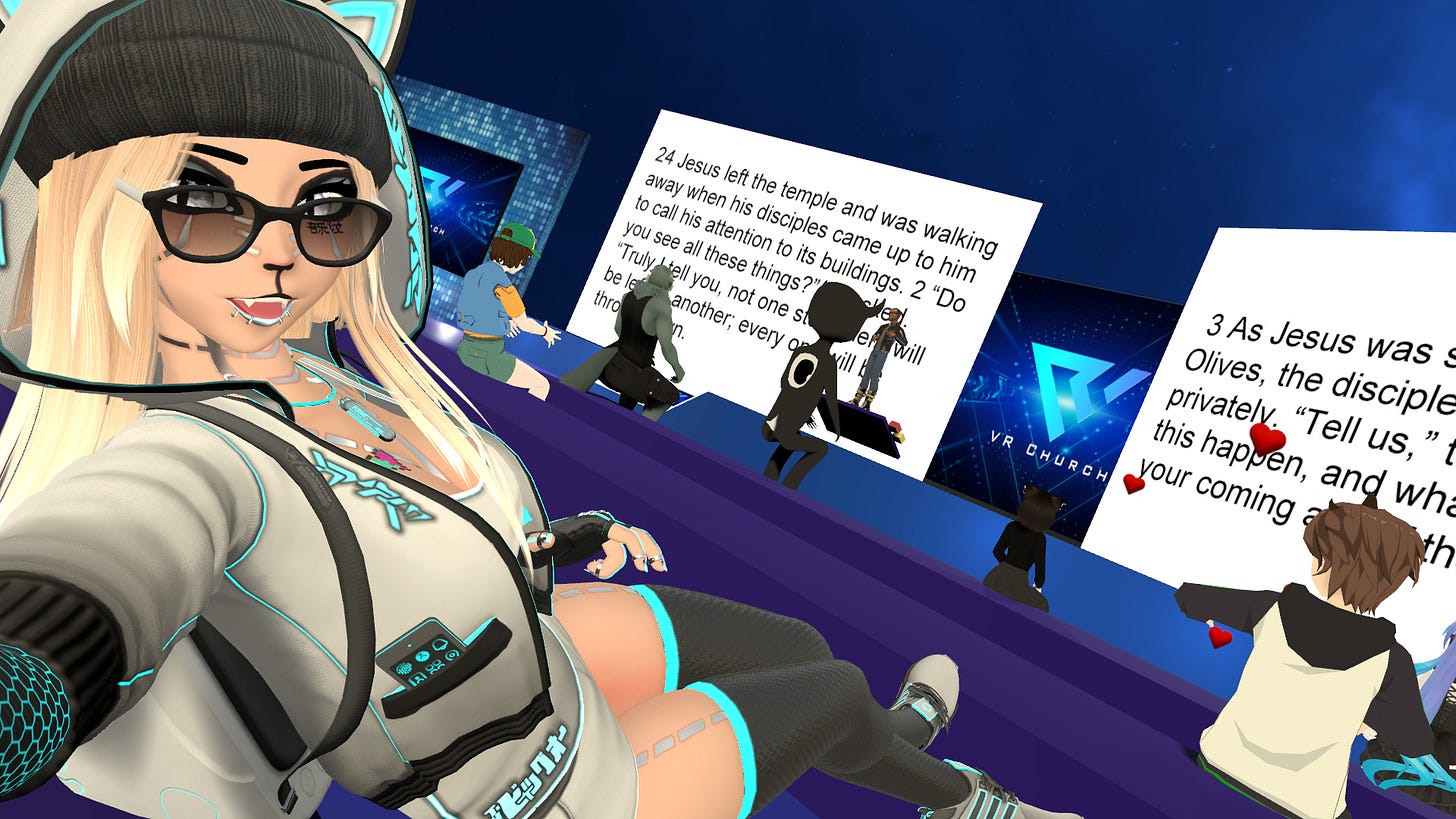4 Lessons from a Metaverse Pastor
If you don't have time to read anything else, read the last one.
Newsletter Summary:
4 Lessons from a Metaverse Pastor 🗝️
Extra Resources ✨
Synopsis: Experiencing new things brings new knowledge, and I’ve learned many new things as a metaverse pastor. Here are a four lessons:
4 Lessons from a Metaverse Pastor 🗝️
Important: Honestly, each topic needs its own newsletter. Keep that in mind. Today’s newsletter is intended to be a brief overview with more depth to come.
1. Reimagination > Replication
In 2016, we planted the first church in the metaverse. At the time, we did what made sense to us: we replicated the physical church experience. We subconsciously replicated the church one for one.
We replicated things like a one-hour church service on Sunday with a one-hour small group during the week. This makes sense, right? Yes, it was only logical. After a couple of years, we realized that VR Church was unsustainable with areas of ineffectiveness because we were trying to fit a square peg in a round hole.
The metaverse is a new construct and demands a new expression. We were trying to base our metaverse church on a physical church model that in and of itself was questioning its own ecclesiology.1
Then we had an epiphany. We were not supposed to replicate the church. We were destined to reimagine it. To be clear, we are not reimagining theology, but we were reimagining the form, expression, and format. This mindset shift laid the foundation for a church that could meet anywhere at any time with anyone (DAO).
One example of this reimagination is how we present the scriptures. For the longest time, we would deliver sermons from a stage (replication). Then we realized we were in the metaverse and the “possibilities are endless because we control TIME and SPACE.”2
Remember that moment in Inception when Leonardo Dicaprio and Ellen Page were walking around Paris and they were building with their minds?
The metaverse is the same thing as Inception in that we can gather instantaneously (time) and build anything (space). This is a powerful combination we haven’t seen in church history. It was time to begin the reimagination process. VR Church would now be otherworldly.

We started to build whole worlds so people could interact with the scriptures in a whole new way (reimagination). Imagine walking through the Red Sea with Moses. What if you walked into Jesus’s tomb in the resurrection story? What if you got on the boat with Paul during a storm at sea? We did all this and it has been amazing!
A new sermon experience was born.
2. Relationships in the metaverse are deeply authentic
In the early days of VR Church, we received much criticism, and the criticism seemed to revolve around the topic of authenticity: that people would be fake in the metaverse. The assumption was that discipleship and “true” relationships were not possible because they were not based in the physical world.
However, we found the opposite to be true. In our experience, the metaverse church is fertile soil for people to be more authentic than the physical church has seen in a long time. We believe this is true because the anonymity of the avatar drives deep authenticity.
Other ministries who have entered the metaverse have noticed this avatar authenticity as well. When superficial judgments like race, weight, and height are removed from the picture, we find the nucleus of human interaction: spirit-to-spirit relationships. It’s beautiful!

While traveling to raise support in the early days of VR Church, I was at a friend’s house in Phoenix, Arizona. He let me set up VR Church at his house for a Sunday, and he took some time to watch the interactions.
After church, a young adult from Boston introduced himself and immediately started talking about depression and suicidal thoughts. We spent some time talking with this individual and encouraged him. After the service, my friend commented in amazement how people were comfortable opening up about their life experiences. He noticed what we’ve known for years.
The metaverse can be a beautiful place for a new era of relationships and conversations in a virtual setting.
3. A metaverse church is the same as a physical church
This topic requires a deep dive in a future newsletter. However, allow me to tell you about a significant psychological shift in the early days of VR Church that established the foundation for a church-planting movement in the metaverse.
The first year of VR Church was experimental to a certain degree. Meaning, I didn’t necessarily think of it as a church plant at the time. We had church services on most but not all Sundays, and community building was not a prominent effort. Then the church started growing and we began to have “regular attendees.” A leadership team was formed. We were becoming organized.
Something happened around May of 2017. I can’t remember if what follows was over one or a series of conversations, but we were awakened to a certain reality: VR Church was not different than any church out there and we should treat it as such.
We realized that we were expressing the Ekklesia in the same way as a physical church and then some. We are able to do it all and there are no limitations. There may be differences but that doesn’t mean there are exclusions.
Looking back, this radical shift of an equal-value mindset was an important moment in our church. This mindset has served hundreds of people across the world who can’t physically attend church because of physical disability, illness, severe social anxiety, and more.
A metaverse church is the same as a physical church
4. God is in the metaverse
Finally, and most importantly, God is in the metaverse. My assumption is that church leaders would disagree with this statement. In the last newsletter, we examined church leaders’ low regard for keeping up with the latest technologies. I wonder if we as church leaders believe that God is not in technology.
However, we believe God is omnipresent. He is everywhere. He is in all types of dimensions. There is no limit to God’s love even in virtual worlds.
In the early days of VR Church, this belief was fortified after a particular church service. An individual came up to me after the service and commented that during the worship music he felt something. From my remembrance, this person would not identify as a person who believes in God. A friend standing next to me said, “What you felt was the Holy Spirit.” He was right. Till that moment, I had not consciously acknowledged God was with us in the metaverse because of staunch theological attitudes that declare faith could only be experienced in the physical world.
The reality is that God loves the citizens of the metaverse.
God’s love pursues us across all dimensions.
Extra Resources ✨
The latest report from the American Bible Society states ""Ministry-as-usual is poorly fitted to turn the tide." - John F Plake, PhD.
Listen to Pastor Koko from VR MMO Church talk about innovation in ministry.
"The Problem: Creation of a professional clergy class distinction, introduction of liturgical structures, elimination of mutually participatory gatherings resulting in a programmed delivery of music & speeches to a passive audience." (quote from a random dude)


















